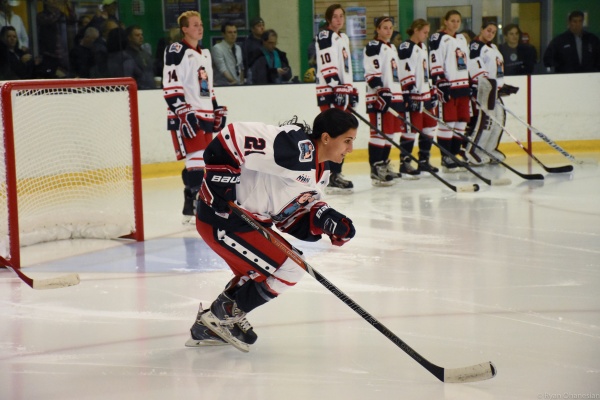Feminism Scores a Hat Trick with Women’s Hockey League
Gabie Figeuroa, number 21 for the New York Riveters, takes the ice with her team for the NWHL’s first season. (Ryan Ohanesia/Via Flickr)
November 5, 2015
The Buffalo Beauts, the New York Riveters, the Boston Pride and the Connecticut Whales—names that are not yet familiar with mainstream sports fans, but are well on their way to making sports history as the four founding teams of the National Women’s Hockey League (NWHL). On Oct. 11, 2015, the puck dropped at Chelsea Piers, CT to signal the start of this inaugural season.
Largely thanks to the devotion of commissioner Dani Rylan, an announcement was made in late March of this year that the United States was set to host the first ever professional ice hockey league for women which offers a salary to its players. As a step forward in the world of women’s sports, trailblazers from across the globe have brought their passion, skill, and skates to New York, Connecticut and Massachusetts.
On Friday, Oct. 23, I found myself in Rink A of the Aviator Sports Complex in downtown Brooklyn, the new home-ice for the New York Riveters. One of the team’s defensemen, Gabie Figueroa sat down with me after practice to discuss her journey to the professional league and how she envisions the expansion of ice hockey for the next generation of young women.
THE OBSERVER: At what age did you find your passion for playing this sport specifically?
GABIE FIGEUROA: I started pretty late. I started playing ice hockey when I was nine. A lot of people who play ice hockey usually start at three or four because their families play hockey. I got into it because my brothers’ friends in grammar school played, so I really wanted to play. And girls’ hockey has really taken off in the past fifteen to twenty years. Thirty years ago there was never any opportunity for girls to play, so all the daughters would just go to the rink and watch their brothers. Starting with my generation was the first big wave of girls’ hockey and ice hockey teams, so I played on a girls’ hockey team growing up and simultaneously I played on a boys’ team to stay competitive.
O: Did you ever find disadvantages while playing on a boys’ team?
G.F.: I always enjoyed it. I have two brothers, so I always really liked it. To a certain extent girls hit puberty first and they grow a little bit before the boys. When you’re thirteen-fourteen you can fit in with them, but beyond that point the boys start getting stronger. That’s really when you have to find a girls only league.
O: Did you have certain players you tried to model yourself after while growing up?
G.F.: Nobody in particular, but 1998 was the first time women played ice hockey in the Olympics and the U.S. won. I was only six when that happened, but probably in ’02 I was following that. At least there was always the Olympics for girls, so growing up that was a dream of mine. I work a full time job too, so after college I wasn’t expecting to continue playing just because only the top twenty girls get to play in the Olympics. But now there’s more opportunities.
O: What was that transition like between your college career and now starting in a professional league?
G.F.: Girls’ hockey really isn’t that big of a sport, as far as numbers compare, in college. So there are approximately thirty division I hockey teams in college, whereas girls’ basketball there might be three hundred to four hundred. It’s a lot smaller of a sport, and it’s only growing more. Every year, even when I just first started playing college, there was still some weaker teams in Division I, but now it’s become more even because the talent is getting better everywhere.
O: When you have these games, you obviously see the fans in the audience. Has any younger fan ever come up to you personally and said this is something that they’d wish to pursue in their life and are modelling themselves after you?
G.F.: Yeah, you know there is a great opportunity right now for young girls. One of the coolest things for us is that we’re an inspiration. Like I said earlier, when I grew up it was mostly the boys who had an opportunity to make it big in hockey, but now a girl can say I want to be a professional ice hockey player and it’s not a far reach; it’s a workable dream. It just takes hard work and passion.
O: Finally, where do you see the league in about five years from now? Do you see it expanding and reaching out to more cities other than the North-Eastern territories?
G.F.: Yes, it should hopefully expand. I know there are some backdoor deals going on with the NHL, so hopefully in five years we have a good partnership. It’s growing more. Maybe we’ll play in bigger arenas and grow the game more. That is the most important part.
O: So you feel that there is a positive relationship with the NHL?
G.F.: Yes. Last night me and three of my other teammates went to the Rangers game and it was fun. We were walking around the concourse and people were coming up saying, ‘Oh, I went to your game last week, and I’m coming this week. I just bought your jersey, I bought a t-shirt,’ and I never imagined that happening. It’s taken off incredibly so far.
The Riveters can be seen live at Aviator Sports Complex on Nov. 15, 2015, or through the official NWHL Youtube stream, for their next home game against the Boston Pride. Tickets are available online and at the box office on game day.












